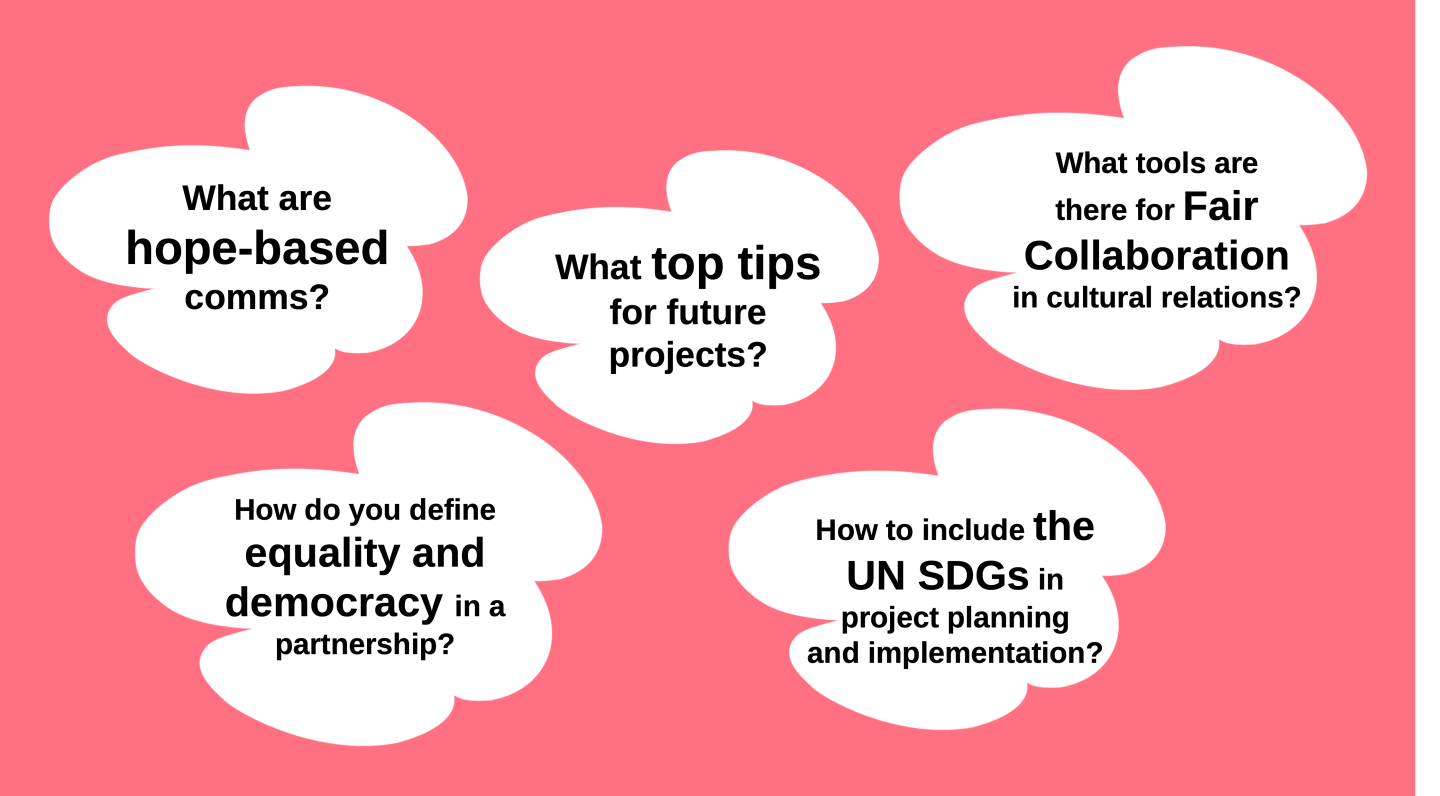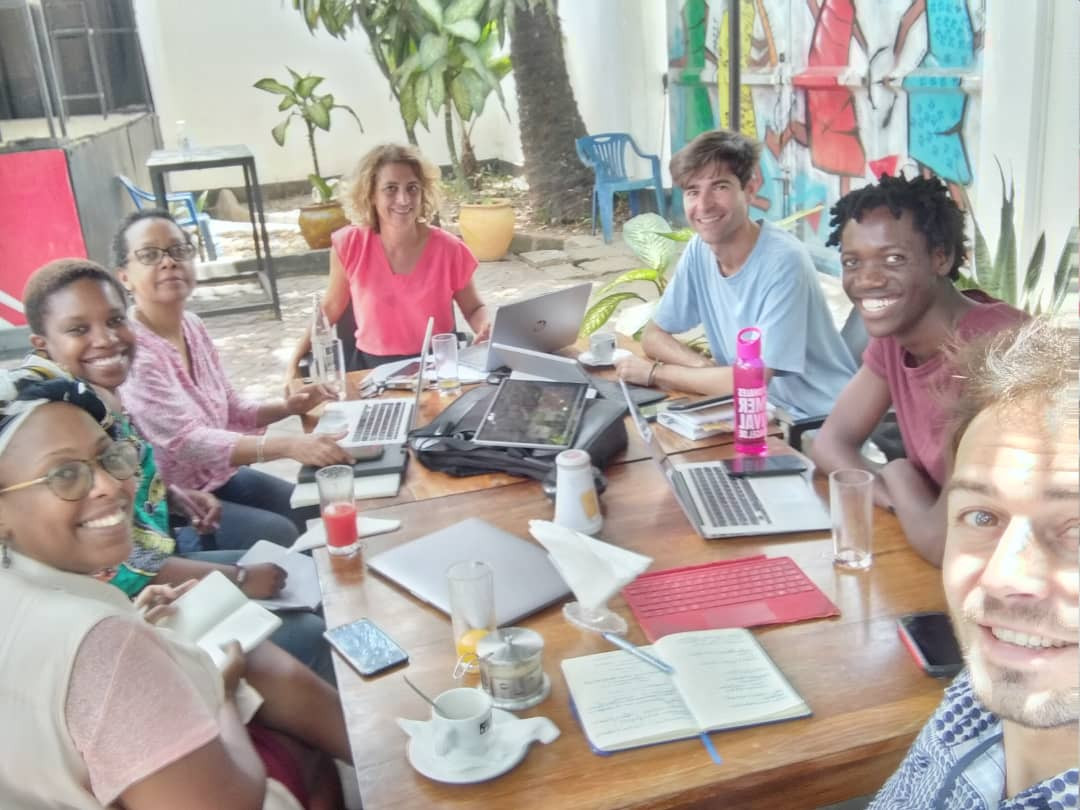

"Having an honest relationship among all of us helped to resolve issues"
On 26 and 27 September, the European Spaces of Culture Lab took place online, bringing together representatives from the 11 ideas shortlisted under most recent call, together with external actors in the field of international cultural relations.


The Lab was open to any member of the shortlisted project teams, to meet with each other and with the EUNIC Global team and see how to develop their proposed ideas into concrete models of European Spaces of Culture. The two-day meeting gathered 70 participants, representing EUNIC members, local partners, EU Delegations from the project teams, as well as alumni from Spaces projects and representatives from the European Commission.
Robert Kieft, Project Manager of European Spaces of Culture, introduced the meeting and reminded the overall purpose of European Spaces of Culture, followed by a few words by representatives of the European Commission. Monica Urian from DG Education and Culture stressed the importance of this kind of initiative today: “International cultural relations have never been so hard and so necessary to do, and we need to scale up our effort in this area”. Greta Galeazzi from DG International Partnerships also acknowledged the importance of European Spaces of Culture as a good testing ground.
The UN Sustainable Developemnt Goals always offers a wonderful framework to talk the same language with the other partners.
Pauline Laravoire, Y-East
One of the objectives of the Lab was to discuss important topics that transpire throughout the European Spaces of Culture programme. After a brief presentation round where each project team pitched their ideas, which showed the vast variety in local contexts, topics addressed, and approaches, the Lab was joined by representatives of currently running pilot projects (Pauline Laravoire from Y-East, partner in the project Moving Kolkata, Kolkata Moving and Anders Hentze from the Danish Cultural Institute in Saõ Paulo, partner in Politics of Nature to discuss how European Spaces of Culture can contribute to achieving the UN Sustainable Development Goals.
Another topic that is crucial to European Spaces of Culture and was discussed throughout the Lab is Fair Collaboration, and what it really looks like in cultural relations. Avril Joffe, co-author of “Not a toolkit! Fair collaboration in cultural relations: a reflAction” addressed this topic focusing on the Project Management Cycle and the Fairness Checker, two key components of the non-toolkit, and discussed practice and fundamental questions of fair collaboration with the participants.
Local partners know better the policies, how to communicate with local audiences, etc.
DAWA team, European Spaces of Culture alumni
As a community building platform, the Lab was also the occasion to look back on European Spaces of Culture and share some of the lessons learned so far. Over the years, the Preparatory Action has started to create a community of alumni which is important to share these lessons learned.
During the Lab, several alumni joined to share their experience, challenges and successes with the current shortlisted project teams. Some of their recurring advices were to rely on the knowledge and network of local partners, be generous and open to share responsibility with all partners, to be flexible in budgeting, planning and implementing, and to accept that equal partnership does not have to mean equal amount of work from all the partners of the project.
Having an honest relationship among all of us helped to resolve issues.
UMOJA team, European Spaces of Culture alumni
Spaces alumni in the Lab included Louise Leick and Valentín Castillo, coordinators of Flash ACT (Mexico); Christiane Schulte, Irene Muller (Goethe-Institut Uruguay) and Andrea Fantoni and Camila Barrios (SODRE), partners in Sin Límites (Uruguay); Oliver Hartmann (Goethe-Institut Shanghai) and Mao Ling (Theatre Young Shanghai), partners in Diverse As We Are (China); and Jose Ramos Garcia (Embassy of Spain) and Chi Temu from the UMOJA Project Management Team (Tanzania). Their insights are crucial for the 'new' teams to take on board while they develop their final proposal.
The project teams also had the opportunity to hear some impressions from two members of the jury which shortlisted the 11 ideas. Marijana Cvetkovic (Independent cultural manager and co-founder of the Platform for theory and practice of the commons, University of Arts in Belgrade) and Yemisi Mokuolu (Independent producer and creative industries consultant, founder and CEO of HATCH Africa, and co-founder of Asa Bako festival, Ghana) gave some insights into the selection process, what they are looking for in the next round of selection and what are generally the positive points as well as the points for improvement.
Bring into the light some more difficult conversations - be really clear on the change the project wants to see happen in the world.
Yemisi Mokulu, European Spaces of Culture jury member
The Lab finally included parallel sessions in smaller groups of two project teams that rotated in break-out rooms to discuss practical aspects to help them in developing further their proposals: best practices and tools to build towards a horizontal partnership, the including hope-based communication in their communication and visibility strategy, and the future monitoring and evaluation strategy of their project.
The 11 project teams are now invited to further develop their ideas into concrete proposals for projects taking place between January and October 2023. Deadline for submission of the final project proposals is 20 November 2022.
